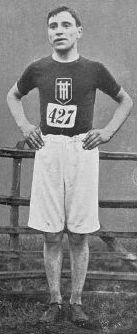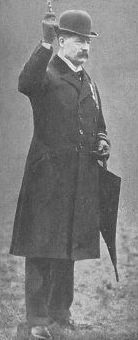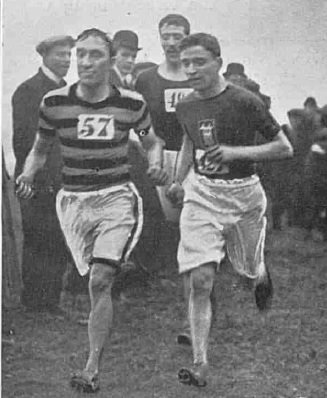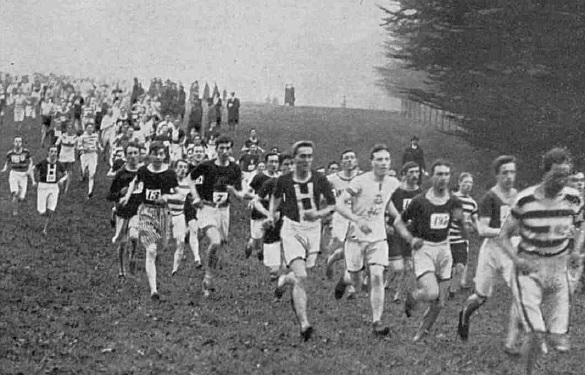Taplow Court on Saturday 04/03/1911 (Senior Men)

HAPPY HALLAMSHIRE
HIBBINS THE CHAMPION.
Southern sportsmen, I am afraid, were not altogether satisfied with the display given by their leading runners in Saturday's National Cross Country Championship at Taplow Court. I agree that a number of them did not do themselves justice, but, at the same time, the calibre of the opposition was clearly too good for them. In a few words, then, followers of the sport have the secret of the Northerners' success. This was of course, expected, but not so easily as Hallamshire actually won from Highgate.
One scarcely knows whether to give the greater praise to Hallamshire for their all-round excellence F. N. Hibbins for his individual brilliancy. Anyhow, both performed so well that the 35th annual race under the auspices of the N.C.C.U. will always occupy a prominent place in the pages of athletic history.

Fred N. Hibbins first man home
The crowd was of goodly dimensions, but I had thought it would be larger. No better venue for a championship of this importance could have been obtained in the South, and nothing was wanting for its complete success. Hallamshire revelled in the going, and as man after man of theirs followed each other whenever they came into sight they were practically the only team in the race for the honours of the day.

Lord Desborough, on whose ground the meeting was held, firing the starting pistol
A CLASSY FIELD
In spite of the fact that this was, perhaps, the most classy lot of runners that had ever contested the National Championship, their total scoring points was considerably lower than that by which they triumphed in 1910. They were at full strength, but were disheartened by the arrangements made by the railway companies for their convenience in getting to Taplow. This, indeed, was the only discordant note I heard struck in connection with the race. The club champions' president, Mr. Newbould, who accompanied the side, appeared to forget this for the nonce. He was quite happy when asked to keep again in safe keeping the Challenge Cup for the next twelve months.

W. Scott (57), F. Hibbins (427) and C. Vose (493)
Murphy was, it was confided to me, anxious to show Vose (Warrington), the Northern champion, that he was the better man. In this, however, he failed, for Vose ran a grand race throughout.
Scott, who travelled up to London on the previous day, was quietly confident, and carried the good opinions of many, In Hibbins, however, he met more than his match. The Thrapston runner shaped like a champion, and it is certain that he is destined for further fame. He has youth on his side, and has the gift of a nice action. The Australian Rhodes scholar, Clemes, showed improvement on any of his previous running, and his selection for the International will be popular. Horne, Highgate's first man home, once more displayed consistency, and his position of eleventh was, for a veteran, remarkable, and the remark applies to his clubmates, Johnston (17th) and J. G. Coughlin (24th).
The greatest surprise was the disappointing exhibition of the favourite and last year's champion, Fred Neaves. It had been stated that he was not himself. Whether this is correct or not the fact remains that he ran below form. He appeared to be all nerves, and this may account for much. Being Southern champion, he could not well be overlooked for the International. All the same, I doubt if he is the equal of Hibbins, and taking a line through Saturday's running I should say Scott and Vose would beat him again.
The time of the leaders, excellent in itself, affords a good criterion of that. Men like Humphreys, Deakin, H. Green, Sims, B. C. Long. J. M. Hill. W. H. Watson, Worsley. A W. Martin, and R. E. Knight were so far down the roll of merit as to prove unmistakably the character of the opposition. It was not the Southerners' day out, and it would be absurd to make excuses for them. They were beaten on their merits. We take off our hats to our Northern friends, and regard Hibbins as a worthy individual champion of the most interesting National race ever decided in the South.

During the first lap in the park
HOW THE RACE WENT.
The clubs which did not supply their full quantum of runners were Crawley H. (six who did not close in and were the only team not to so), Broughton (7), Derby (9), Finchley (11), Hallamshire (10), Herne Hill (10), North Staffs. (9), Polytechnic (10), Ranelagh (10), St. Helens. Sacred Heart (8), Salford (11), Slough (11), Small Heath (10), S.L.H. (10), Southend (9), Surrey (9), Sutton (11), Thrapston (8).
The exact distance was 10 miles 500 yards. From a good start effected by Lord Dasborough, the 239 runners got well away, in a drizzling rain. At the end of the first lap, distance about 1,500yds, Scott was leading 4min 40sec by 3 sec from Murphy and F Neaves. and the colours of Hallamshire were thus early the van. The pace was decidedly fast. When the men came to the judges at 4 miles the order was Vose 22min 37sec. Scott 22mm 37 2/5sec. Clemes 22min 48sec. Hibbins 22min 48 2/5sec. F C Neaves 22min 48 4/5sec. Baldwin 22min 53sec. Murphy 22min 57sec. Brooks (Highgate) 22min 58sec. There was now a long tail; but it was evident that Hallamshire were serious, and were out to give of their best, for they had seven men at this stage in the first 18. Highgate Harriers were also packing well for second place.
Out into the country the runners went again at a smashing pace. Neaves was, in the opinion many, looking none too comfortable, and a beaten man, and the 'knowing ones' from the Midlands were pinning their faith to Hibbins. Later there were a few changes, as at seven miles the order was: Scott 41min 5sec. Hibbins 41min 5 1/5 sec. Vose 41 min 5 2/5sec. Baldwin 41min 30sec. A Turner 41min 34sec. J Murphy 41 min 35sec, Brooks and Clemes 41min 37sec. Neaves 41min 40sec. S Raynes 41min 41sec. Horne 41min 48sec. Welding 41min 52sec. Cottrill 41min 53sec. Aldous 41min 55sec. Cook 42min 4sec.
The splendid packing of Hallamshire elicited the plaudits of the crowd. Here the scores were Hallamshire 58 points: Highgate 103, Warrington 163. Rain was falling fast, but the interest in the race never abated, and when the young Midland champion, Hibbins, went to the finishing post, full of running and comparatively fresh, he was given a hearty cheer, for he had beaten the Northern favourite, Scott, by 150 yards.